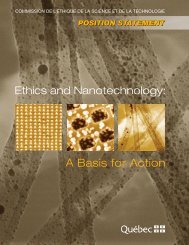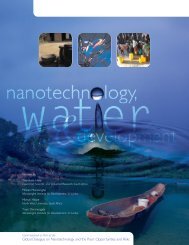Download - Nanowerk
Download - Nanowerk
Download - Nanowerk
You also want an ePaper? Increase the reach of your titles
YUMPU automatically turns print PDFs into web optimized ePapers that Google loves.
5.3.2 Impacts of RFID and related technologies<br />
The EC’s work on better implementation of the Data protection directive 95/46/EC also<br />
includes technological aspects. In 2003 and 2004 the Commission worked on a<br />
Communication on Privacy Enhancing Technologies (PET). At present, “RFID devices raise<br />
fundamental issues on the scope of the data protection rules and the concept of personal<br />
data. The combination of sound and image data with automatic recognition imposes<br />
particular care when applying the principles of the directive.” However, the Commission<br />
believes the rules are still valid. The Directive is technologically neutral, and sufficiently<br />
general to accommodate new technologies, although particular guidelines may have to be<br />
adapted (European Commission, 2007). The European Parliament is also discussing the<br />
implications of RFID chips and how to regulate them. The Scientific and Technological<br />
Options Assessment unit (STOA) of the European Parliament is engaged in a project on<br />
RFID and Identity Management. The final report was announced for April 2007 but had<br />
not been published yet in June. (van ‘t Hof, forthcoming)<br />
Philips’ chief privacy officer Jeroen Terstegge criticised the focus on “personal data<br />
protection” by the EU in the discussion on RFID chips. He believes that the focus of legal<br />
protection should be “digital footprints”, and whether or not these footprints can strictly<br />
be classified as personal data. The point is not that the use of RFIDs chips and data<br />
storage will infringe on personal data protection (Seminar RFID & Opsporing (Tracing),<br />
ECP.NL, Rathenau Institute, RFID platform Nederland, Den Haag, 4 April 2007). 27<br />
Box 1: Case study on Dutch transport RFID chip card<br />
Dutch public transport companies will introduce RFID chip card technology to pay for<br />
tickets in 2009. Two types of tickets are available, anonymous and personalised. The<br />
railway company NS is pushing for the personalised card, by only offering a price<br />
reduction on personalised cards and sending current subscription holders the<br />
personalised card. The Committee on Secure Personal Data (CBP) and the passenger<br />
association ROVER have complained that NS is violating privacy and personal data<br />
protection legislation. A public debate in Parliament and the media started in April 2007,<br />
stimulated by the Rathenau Institute.<br />
The Public Prosecutor Harm Brouwer would also like to be able to use the data collected<br />
with RFID and other chip technologies. He sees opportunities for identifying criminals and<br />
collecting evidence, including their travel by public transport and car (after introducing<br />
road pricing). He discussed these opportunities during a seminar organised by the<br />
Rathenau Institute, RFID Platform Nederland and ECP.nl on 4 April 2007. 28<br />
Proponents for the use of private databases for police and national security purposes, like<br />
Mr Brouwer (see box 1), do not appear to make a rational assessment of the main<br />
current bottlenecks in crime fighting, and identify the optimal use of the public budget for<br />
the police and justice department. Instead they seem to be attempting an increase in the<br />
public budget by imposing legal requirements for storing data on private companies,<br />
without paying for it. This leads to an increase in taxes “in kind” on these companies,<br />
which may lead to higher prices for consumers. The quality of the debate would improve<br />
if all the costs, expected benefits and risks of each technical and non-technical security<br />
option were made available.<br />
In the Nanoforum workshop on Nanotechnology and Security several new ethical aspects<br />
of nanotechnology were discussed, relating to the implications of invisible distributed<br />
wireless sensor networks (possibly mobile). For example, how can informed consent of<br />
the observed persons be guaranteed? Can the devices be turned off after use or by<br />
27 http://www.rathenau.nl/showpageproject.asp?steID=1&ID=2029<br />
28 http://www.rathenau.nl/showpage.asp?steID=1&item=2132<br />
52

















